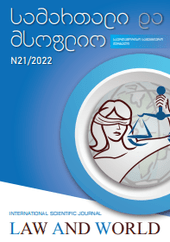Sexual Harassment in Public Place – Existing Administrative Regulation and Problematic Aspects 
##plugins.themes.bootstrap3.article.main##
Abstract
In 2017, Georgia has ratified the Council of Europe Convention on Preventing and Combating Violence against Women and Domestic Violence (Istanbul Convention) and has taken the responsibility to evaluate the form of gender discrimination such as sexual harassment as the act of violence against women and to take all appropriate measures to ensure that any form of unwanted sexual behavior (verbal, non-verbal or physical) which intended to cause or interferes with a persons dignity and in particular which to create an intimidating, hostile, degrading or abusive environment, is subject to an appropriate legal sanction. Sexual harassment is a widespread phenomenon, often based on gender stereotypes prevalent in society. This form of gender discrimination not only violates the rights and interests of the victim but also creates an environment that can be restrictive and damaging to any person. In order to approximate the Convention, the Parliament of Georgia made a number of legislative changes in 2019, including establishing administrative liability for sexual harassment conducted in public places, although by that time Georgian legal space was not familiar with the definition of the public place, which raises the problems for assessing the fact. The article tries to resolve the ambiguous issues related to this subject.






